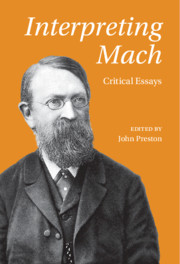Book contents
- Interpreting Mach
- Interpreting Mach
- Copyright page
- Dedication
- Contents
- Figures
- Tables
- Contributors
- Introduction
- 1 Ernst Mach’s Piano and the Making of a Psychophysical Imaginarium
- 2 Mother’s Milk and More
- 3 Meaningful Work
- 4 Mach on Analogy in Science
- 5 Ernst Mach’s Enlightenment Pragmatism
- 6 On the Philosophical and Scientific Relationship between Ernst Mach and William James
- 7 Ernst Mach and Friedrich Nietzsche
- 8 Abstraction, Pragmatism, and History in Mach’s Economy of Science
- 9 Holding the Hand of History
- 10 Ernst Mach and the Vienna Circle
- 11 Narratives Divided
- 12 Phenomenalism, or Neutral Monism, in Mach’s Analysis of Sensations?
- 13 The Case for Mach’s Neutral Monism
- Index
- References
9 - Holding the Hand of History
Mach on the History of Science, the Analysis of Sensations, and the Economy of Thought
Published online by Cambridge University Press: 05 March 2021
- Interpreting Mach
- Interpreting Mach
- Copyright page
- Dedication
- Contents
- Figures
- Tables
- Contributors
- Introduction
- 1 Ernst Mach’s Piano and the Making of a Psychophysical Imaginarium
- 2 Mother’s Milk and More
- 3 Meaningful Work
- 4 Mach on Analogy in Science
- 5 Ernst Mach’s Enlightenment Pragmatism
- 6 On the Philosophical and Scientific Relationship between Ernst Mach and William James
- 7 Ernst Mach and Friedrich Nietzsche
- 8 Abstraction, Pragmatism, and History in Mach’s Economy of Science
- 9 Holding the Hand of History
- 10 Ernst Mach and the Vienna Circle
- 11 Narratives Divided
- 12 Phenomenalism, or Neutral Monism, in Mach’s Analysis of Sensations?
- 13 The Case for Mach’s Neutral Monism
- Index
- References
Summary
I analyse the relation of two important doctrines of Ernst Mach’s epistemology – namely the theory of the elements, exposed in The Analysis of Sensations, and the economy of thought, mainly explored in Knowledge and Error and elsewhere – to his historical-critical approach. After discussing Erwin Hiebert’s seminal work on Mach’s philosophical use of the history of science, I defend the thesis that there is a more profound, structural relationship between Mach’s conception of history and the anti-metaphysical remarks which open The Analysis of Sensations and introduce his theory of the elements. Finally, I contend that this can provide novel insights into the doctrine of the economy of thought.
Keywords
- Type
- Chapter
- Information
- Interpreting MachCritical Essays, pp. 164 - 183Publisher: Cambridge University PressPrint publication year: 2021
References
- 2
- Cited by



